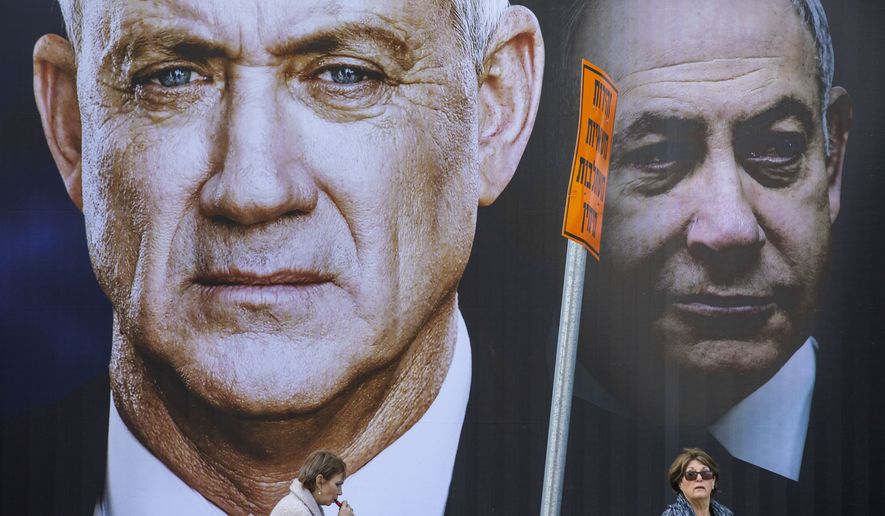JERUSALEM — “I care about Israel.”
That’s the slogan of Blue and White party leader Benny Gantz, the main challenger of longtime Likud Prime Minister Benjamin Netanyahu as poll-weary Israelis prepare for their third national election in less than a year Monday.
Despite significant developments since the September election, which produced a second straight electoral tie, there is little evidence that Mr. Gantz’s level of concern will result in an appreciably different result after the votes are counted.
The upshot: Even with President Trump’s long-awaited peace plan on the table, tensions in the region on the rise and Mr. Netanyahu’s impending court date to face corruption charges, the Israeli political stalemate could endure.
If polls are right, the conservative Likud party will win about 35 seats and the center-left Blue and White will receive slightly fewer. Neither party, it is safe to say, has a realistic hope of gaining a majority in the 120-seat Knesset, so the winner of the election will need coalition partners to form a government.
A group of four right-leaning and religious parties is projected to win 24 seats, but it still will not be enough to give Mr. Netanyahu a majority. Mr. Gantz’s path to power is similarly blocked — unless Likud can be persuaded to dump Mr. Netanyahu as part of a grand coalition deal.
With Mr. Netanyahu seeming to gain momentum in the election’s closing days, the usually low-key Mr. Gantz, a former army chief, took a more aggressive tone. He insisted that Mr. Netanyahu was blocking political progress for purely selfish reasons.
“Netanyahu has ended his historic role from a political standpoint. Likud with Bibi cannot form a government, and without Bibi there’s unity,” Mr. Gantz told reporters recently, referring to the prime minister by his widely used nickname.
But Mr. Netanyahu, a master campaigner despite his polarizing reputation, hit back. He mocked Mr. Gantz for declining a one-on-one debate and said the soft-spoken former head of the Israel Defense Forces “can barely get through a TV interview.”
Israel has been in a state of paralysis since the first election in April, and nearly a third of Israelis polled expect an unprecedented fourth election.
Since Mr. Trump rolled out his “deal of the century” in January, Mr. Netanyahu promised to annex parts of the West Bank, the area Israel conquered in 1967. He told a rally in Beit Shemesh last month that “when we win, we will extend sovereignty over all the Jewish communities in Judea and Samaria,” the Hebrew biblical term for the West Bank.
But the government has not started major annexations of Palestinian-claimed land as laid out in Mr. Trump’s plan. Washington reportedly pressured Israel not to act before the election to avoid provoking the Palestinians.
Mr. Gantz has accused Mr. Netanyahu of a “hate crime against democracy” with his attacks on the corruption investigation and the justice system. Mr. Netanyahu is under investigation for suspected corruption in several cases and is expected to have a trial soon after the elections, but he has ignored calls to step down and his own party backed him in a spirited leadership battle last year.
Struggling for traction
Mr. Gantz heads a party that is heavy on former generals and has partnered with the populist centrist Yair Lapid. But the anti-Netanyahu coalition struggled to increase its Knesset share in the first two elections and did not attract enough allies to form a coalition government.
Mr. Netanyahu also faced several hurdles in the run-up to Monday’s vote.
Gaza-based militants from the Palestinian Islamic Jihad, a movement backed by Iran, fired almost 100 rockets at Israel to protest the Trump peace plan and the planned settlement expansions. The rockets were intercepted by Israel’s Iron Dome air defense system.
Sen. Bernard Sanders of Vermont, the Democratic presidential front-runner, launched a harsh personal attack on Mr. Netanyahu at a recent primary debate. He called the Israeli prime minister a “reactionary racist” and vowed to skip the annual Washington gathering next week of the American Israel Public Affairs Committee, a pro-Israel lobby.
Mr. Netanyahu has promised to move ahead with delayed annexations outlined under the Trump peace plan if he wins a decisive victory Monday. Mr. Gantz said he favored negotiations with the U.S. and Palestinians over unilateral action.
As in the past two elections, Avigdor Lieberman, a former defense minister and onetime Netanyahu ally, could hold the keys to the prime ministership. His Yisrael Beiteinu party could have the balance of power in coalition negotiations, and his refusal to accept Mr. Netanyahu as the head of any new government has torpedoed all efforts in the past year to construct a workable government.
In April last year, Israel had 5.8 million eligible voters. Today, there are 5.9 million eligible voters out of the 9.1 million Israelis.
Turnout may be one more wildcard.
Israel is one of the first countries to hold a major national election since the coronavirus crisis emerged in China and quickly spread around the globe.
Fears of the virus, which has infected several Israelis, may keep as many as 400,000 Israeli voters home, reports warn.
Perhaps reflecting the fatigue of the electorate, the parties have toned down visible campaigning. Few posters have hung on city walls, and fewer cars have been blaring electoral messages and campaign songs.
“The key question on Monday may be which side — the ’no-more-Netanyahus’ or the ’only-Bibi-ers’ — makes the greater effort to actually turn up and vote,” author and journalist David Horovitz wrote in The Times of Israel. “And that will at least partially depend on which of the two rivals — the desperately vigorous Netanyahu or the insistently understated Gantz — is better able to inspire them to do so.”
• Seth J. Frantzman can be reached at srantzman@washingtontimes.com.




Please read our comment policy before commenting.